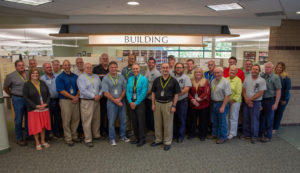
Building department leaders: Rochester Hills pushes to be the best
 Just do it… that’s what Scott Cope said about the International Accreditation Service (IAS) Building Department Accreditation Program, As the director of Building/Ordinance/Facilities for the city of Rochester Hills, Mich., he has a long history of documenting departmental success. “We have a vision,” he said, “to be the best building department in the eyes of our customers and our peers. We improved our ISO rating from a class 3 to a high class 2 and had no opportunity to reach a class 1 due to Michigan laws. When I saw a presentation from IAS about the building department accreditation process, I knew it was an opportunity for us to see where we stand in relation to others in our industry.”
Just do it… that’s what Scott Cope said about the International Accreditation Service (IAS) Building Department Accreditation Program, As the director of Building/Ordinance/Facilities for the city of Rochester Hills, Mich., he has a long history of documenting departmental success. “We have a vision,” he said, “to be the best building department in the eyes of our customers and our peers. We improved our ISO rating from a class 3 to a high class 2 and had no opportunity to reach a class 1 due to Michigan laws. When I saw a presentation from IAS about the building department accreditation process, I knew it was an opportunity for us to see where we stand in relation to others in our industry.”
Cope says that the first benefit his team achieved from the accreditation process was the development of a quality control manual that gave them the ability to create and track service goals. This tracking provided him and his team with the information they needed to help the mayor and city council understand why the department needed more staff in order to achieve their goals. “We were able to show that we were not meeting our service goals with our available resources and to justify our request for additional staff,” he said. “We had metrics that clearly demonstrated the need for additional staff and, as a result, we received a unanimous vote approving our request.”
Developing valuable resources
Through the accreditation process, the Rochester Hills team developed a Special Inspection Program. It includes a guide explaining the purpose of special inspection activity and the type of special inspections required. Resultant elements include a formal Special Inspections & Testing Agreement that explains the responsibilities of all parties involved in the process; a Statement of Special Inspections that is used by the design professional to identify what inspections are required and who will be performing them; a section identifying the Minimum Qualifications for Special Inspectors; and a Special Inspection Log to help inspectors document activity on the job site.
Keeping documents current
The Rochester Hills building staff also developed a Document Control Program to ensure that internal staff and their customers are working with the most current versions of all departmental documents. “Each staff member has two icons on their computer,” explained Cope, “one for internal documents, and one for external documents. One click on the icon and they have access to all documents.” The system includes a search feature that allows quick access to a document by using the document number or any part of the document title. “This unique program allows staff to quickly find, print, email, discuss and distribute every document the department uses to conduct its daily business; and it allows for rapid changes to any document to reflect code updates, policy changes, new ordinances and more,” said Cope.
“The accreditation process has given us the tools we need to realize our vision as we continually search for ways to improve our operations. I recommend and encourage you to take the step — you will never regret it. I believe accreditation can be a significant benefit to any building department, large or small.”
— Scott Cope, Director of Building/Ordinance/Facilities, Rochester Hills, Michigan
Kudos to continuous improvement at IAS
Cope is complimentary of the changes that IAS has made to the accreditation process to make it more user-friendly and responsive over time. “In 2008 we were the eighth in the nation to receive accreditation and at that time the application process required a large amount of documentation. We ended up submitting several binders of information to show compliance with the AC251 criteria. The process has changed significantly since then and is now much more manageable with respect to the documentation required.”
For the city of Rochester Hills, accreditation is a gift that keeps on giving. “It will benefit your department and community in ways you not will fully understand or realize until after you have had time to experience the changes in your department’s operations,” explained Cope. “We have been accredited for more than 10 years and I’m still seeing evidence of how the accreditation process has helped us in our day-to-day operations and is continually helping us to improve.”
A few examples include:
- The tracking of service goals that allows the team to shift resources to address concerns proactively;
- Using documented procedures to train new staff and ensure continued consistency in operation as key people move on or retire;
- Utilizing service goals to determine appropriate staffing levels.
If your building department could benefit from new ideas and system enhancements, IAS provides a one-day training program for individuals interested in better understanding the requirements for the accreditation of building departments and third-party providers of building department services.
This article is part of a series from the International Accreditation Service (IAS) profiling building departments and third-party service providers accredited by IAS — a non-profit accreditation body and a subsidiary of the International Code Council. Building Department Accreditation and Building Department Third-Party Service Providers Accreditation are two of the programs offered by IAS to provide evidence that departments have met a national accreditation standard and are competent to provide public safety services for their communities. To learn more about these accreditation programs, visit the Building Departments and Third-Party Service Provider Accreditation page.








